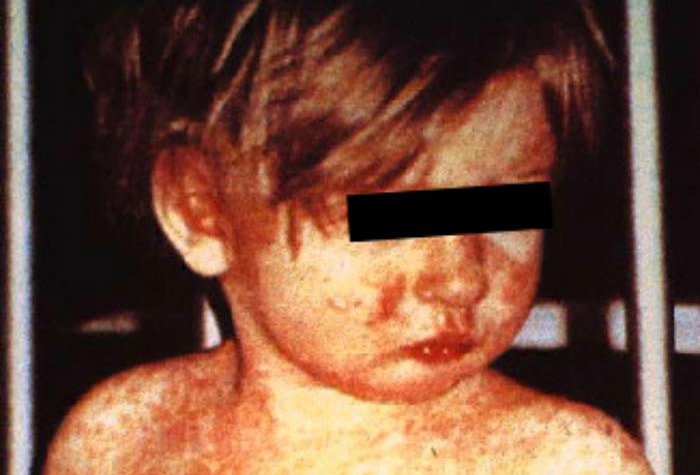Measles has been in the news since December’s Disneyland outbreak. At least one hundred and thirty cases existed in California and the disease spread to Colorado, Utah, Nevada, Washington state and Canada. The majority of California cases occurred in persons over twenty, and San Diego county holds the dubious honor of the third highest measles infection rate in the state.
The Mickey Mouse measles outbreak isn’t the only one, even though the United States officially eliminated the disease in 2000. It’s cropped up sporadically in the last few years, but an upwards infection trend could suggest the disease is making a comeback, with this and last year’s 383 cases in Ohio’s Amish community serving as a nasty reminder of what viruses do to unprepared communities.
Photo courtesy of the Public Health Library.
What is measles? What about the vaccine?
A highly infectious, airborne virus that only infects humans. The best known symptom is the bright red full-body rash that covers infectees several days after catching it, though it also causes fevers up to 105 degrees, coughing, nasal drip and red eyes. Measles is contagious for several days before symptoms arise and after they disappear.
There is no “cure” for measles; once you catch it you’re stuck with it until your body fights off the virus, though you can treat the symptoms with appropriate medications. The MMR (measles-mumps-rubella) vaccination and dedicated measles shots are highly effective at prevention. They work by introducing a weakened or dead virus to the immune system, which learns how to produce antibodies that work against the real thing.
Measles is typically a childhood disease since it spreads quickly and catching it leaves you with life-long immunity. Without a supply of new hosts the virus burns out, but it’s so infectious that a single vector can spread it to everyone at risk before their symptoms show up.
Most vaccine side-effects are minor and short-lived, including fever, swelling around the injection point and elsewhere, and rashes. That isn’t all though: measles vaccine (through MMR) has been known to cause fever and accompanying seizure in severe cases, joint issues in women, platelet reduction and bleeding, and in extremely rare cases severe allergic reaction. Human error might see an immunocompromised person given live vaccine, and contaminated vaccines can pose any number of health risks. Even with this, the CDC and most doctors say vaccines are safer than the diseases they prevent.
Why is measles an issue for San Diego?
The sensational headlining—measles in Disneyland!—catalyzed pro-vax scolding and anti-vax sentiment. It’s drawn attention to falling vaccination numbers and reignited the old debate about vaccination for the social media age. The core of the vaccination debate is whether the benefits of vaccination outweigh the potential risks, and whether individuals should have the right to choose whether or not to be vaccinated.
It’s really about vaccination
Vaccination has been debated vigorously since the earliest smallpox vaccines caught on. Then, as now, concerns about the science, the safety of children, religious obligations, the public good and personal liberties butted up against one another. In 1809 Massachusetts was the first state to mandate vaccination, and in 1905 the matter was taken before the Supreme Court in Jacobson v. Massachusetts. The Supreme Court ruled that the Fourteenth Amendment did not free Jacobson, who had been sickened by a vaccine in childhood, from the vaccination mandate, but they also ruled that the state could not force vaccination when the vaccine could harm the recipient. This provided the basis for medical exemptions to vaccination.
There are 3 types of vaccination exemptions
There are three kinds of exceptions to mandatory vaccination laws: medical, religious and philosophical. Immunocompromised individuals, whether from medical procedures, genetics or disease, cannot receive certain vaccine injections without risking catching the disease the vaccine should protect against, or their protection might be reduced or non-existent. Religious exemptions exist in 48 states, allowing parents to avoid having their child vaccinated if they feel their religious beliefs might be compromised while the personal belief exemption allows parents in twenty states to opt out for other reasons.
One persistent problem is that vaccinations are not 100% effective
While most people infected in the Disneyland outbreak were unvaccinated, several had multiple doses of the vaccine as recommended. This reflects poorly on the vaccine, though it shouldn’t: millions of vaccinated Disneyland vacationers avoided the disease, and they did not go on to spread it to their local communities. The vaccine did the job, what failed is community immunity.
Also known as the herd effect, community immunity is a passive benefit of mass immunization. When an overwhelmingly large number of people are immune to a disease through vaccination or previous contraction, they act as a wall against it. Not only are they not going to catch the disease, they will not be vectors for the disease to reach vulnerable targets. To reach real “herd” status statistically, roughly 95% of a population needs immunization. At that point the remaining five percent are protected because the likelihood of all of them catching it at once is exceptionally low. By 2000 enough people had immunity that all American strains died out. Vaccination rates have fallen since then, as people exempt their children from vaccines. Do we really want to go back to this harrowing statistic from Vox.com: “In the US, before a vaccine was introduced in 1963, there were four million measles cases with 48,000 hospitalizations and 500 deaths every year.”
Unless something truly dramatic happens, both the measles and the fuss about them should die down. Still, science, civil liberties, choice, community and the law all have a say in how we think about the itchy blotches, and the issues they raise won’t go away so easily.
Read our follow-up on this subject and a look at what the LAW has to say about vaccines: “California’s Vaccination Policy – The Case for Civil Litigation.”
- Are Dogs Attacking Without Warning or Are We Misinterpreting Key Signals? - March 4, 2024
- Can You Sue If No One Witnessed Your Slip and Fall Injury? - February 10, 2024
- Breakthrough Spinal Cord Injury Research at UC San Diego - August 26, 2021










